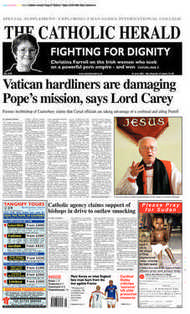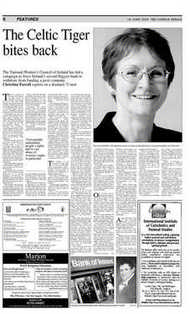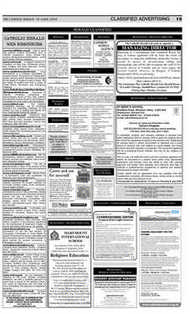Page 5, 18th June 2004
Page 5

Report an error
Noticed an error on this page?If you've noticed an error in this article please click here to report it.
Tags
Share
Related articles
News In Brief
‘we Have So Many Uncanonised Martyrs’
Four Die In Terror Attack On Pakistani Mission Hospital
Christians Face Muslim Terror
Catholic Priest Murdered In Pakistan
Natural Disasters And Islamist Persecution
Pakistani Christian bludgeoned to death in hospital bed
Muslim police officer attacks Christian with a hammer then tells authorities he ‘wanted to earn a place in heaven’
ACHRISTIAN man died from severe head injuries after three days in a coma following an attack by a Muslim police constable who struck him with a hammer while he lay defenceless in hospital.
Samuel Masih was hospitalised on 22 May having contracted tuberculosis in prison. He had been detained since August 2003 under Pakistan’s controversial “blasphemy law” for allegedly defiling a mosque.
In the early hours of 24 May 2004 PC Faryad Ali entered Samuel’s room and, in spite of the presence of a police guard, assaulted Samuel with a brickcutter’s hammer.
Faryad Ali sought to kill Samuel because of the accusation of blasphemy. Samuel went into a coma from which he never recovered. He died on 28 May.
Mr Ali said that he felt it was his duty as a Muslim to kill Samuel. He told police, “I wanted to earn a place in heaven.” According to the Barnabas Fund, a charity which helps persecuted Christians in Muslim countries, Faryad Ali had previously expressed hatred for Samuel to his colleagues. He was arrested for attempted murder, which was changed to formal murder charges after Samuel died.
The “blasphemy law” is often misused by Muslims in Pakistan to get revenge in personal disputes, especially against Christians who are particularly vulnerable because the testimony of a Muslim in court is valued above that of a non-Muslim.
Librarian Muhammad Yaqoob of the Idara Darusalam Jinnah Garden Mosque in Lahore, who filed the charges against Samuel, claimed he saw Samuel spit on the wall of the mosque near the library.
Before his arrest Samuel had worked as a painter and whitewasher.
Devout Muslims often feel they shoud kill alleged blasphemers, whether convicted or not. Four Christians accused of blasphemy have been murdered between 1992 and 2002.
Most Christians who have been accused and acquitted have had to leave Pakistan and come to the West after their release because anyone even accused of blasphemy is considered by Muslim extremists to be guilty for life.
The situation in Pakistan has prompted Franciscan and Dominican pressure groups to lobby two United Nations panels for the repeal of the blasphemy laws, it also emerged last week.
The groups — Franciscans International, and Dominicans for Justice and Peace — are understood to have been encouraged by Pakistani President Pervez Musharraf’s recent announcement of a possible revision of the country’s laws.
Mr Musharraf’s announcement, at a recent congress in Islamabad, stated that some standards in the Islamic criminal code might be amended.
“Since 1986, the blasphemy laws have victimised minorities in Pakistan,” explained a statement issued by Franciscans International. “Article 295C of Pakistan’s Penal Code denounces ‘all those who in words or writings, gestures or visible representations, with direct or indirect insinuations, insult the holy name of the Prophet’.
“Consequently, through false accusations, many minorities repeatedly experience humiliation, intolerance and violence.” Since 1997, Franciscans International and Dominicans for Justice and Peace have inter vened at the U.N. Commission and Subcommission on Human Rights and called upon the Pakistani government to repeal all discriminatory laws, specifically the blasphemy statutes.
The groups view the application of the death penalty as a violation of the right to life as proclaimed in the Universal Declaration of Human Rights.
“Religious intolerance remains as one of the root causes of a number of conflicts, war and ongoing violence in the world,” said Philippe LeBlanc, the director of Dominicans for Justice and Peace.
He added: “The absence of political will on the part of some governments to end this discrimination and the lack of prosecution in cases further encourages groups to victimise individuals and organisations.” The British Government has been kept abreast of the persecution of Pakistani Christians by the Centre for Legal Aid Assistance and Settlement, a human rights charity based in England which last month wrote to the Foreign Office to complain about the murder of Javaid Anjum, 19, a Christian murdered by a mob at a Muslim seminary.
blog comments powered by Disqus

















